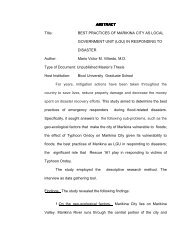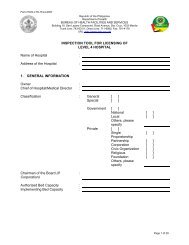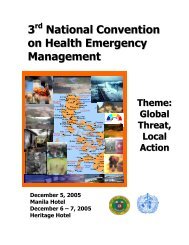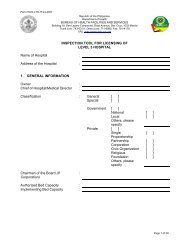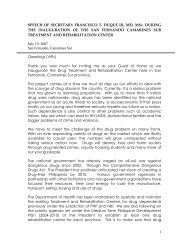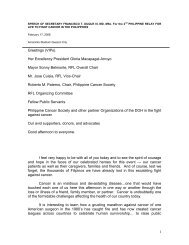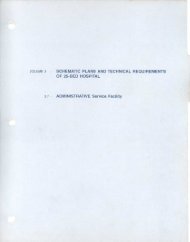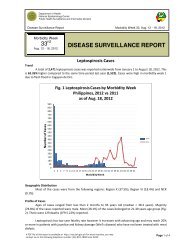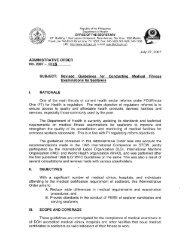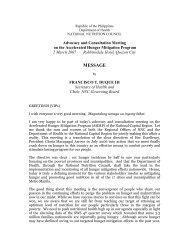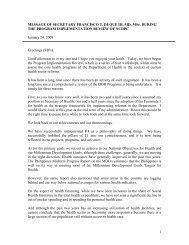government officials expressed their supportfor the Abaya bill through a position papersigned during a press briefing. They areformer DOF secretaries Ernest Leung, Robertode Ocampo, Jesus Estanislao and Ramon delRosario; former DOF undersecretaries RomeoBernardo and Milwida Guevara; former <strong>DOH</strong>secretaries Alberto Romualdez, EsperanzaCabral, Jaime Galvez Tan, Juan Flavier andAlfredo Bengzon; and former NationalTreasurer Leonor Briones.For her part, Bureau of InternalRevenue Commissioner Kim Henaresemphasized that the Abaya bill is beingpushed for its benefits for the health ofFilipinos as it seeks to prevent smokers andpotential smokers from indulging in thisaddictive and harmful behavior. She saidthat the bill would tax all tobacco companiessimilarly, and added that it is unfair for nonsmokersto pay for the health bills of smokers.With the proposed bill, the governmentthrough its Kalusugan Pangkalahatanagenda, it will have enough money toshoulder expenses of smoking-relateddiseases.Dr. Shin Young-soo, World HealthOrganization (WHO) Regional Director forthe Western Pacific Region, also throws inhis support the use of a percentage of theproposed tobacco tax increase for health."For a half century, the scientificcommunity has generated solid androbust evidence to show how smoking andexposure to secondhand smoke directlyharms health," Shin said. "We know thatHEALTH tipsecondhand smoke contains not justnicotine and tar but more than 7,000 otherchemicals, including hundreds that are toxicand about 70 that can cause cancer. WHO hasa very clear stance on tobacco control and isdetermined to help governments protect thehealth of their people."We realize that developingstrong tobacco control policies is notsimple. Nevertheless, we know that therestructuring of tobacco prices and taxesin the Philippines would significantlyreduce tobacco consumption and preventunnecessary suffering and death fromcancer, heart disease, stroke, and suchchronic respiratory diseases as emphysema,which, with diabetes, are now the leadingcauses of illness and death in the country,”The National Youth Commission(NYC) is also in the bandwagon appealingto Congress for higher taxes on cigarettesto discourage Filipino youth from acquiringthe deadly habit. NYC Commissioner PercivalCendana said, “We have one of the cheapestprices of cigarettes, not only in SoutheastAsia but also in the Asian region. At present,a local cigarette stick costs P2.”The most popular brands ofcigarettes sold in the Philippines cost anaverage of less than 50 cents per pack. Bycontrast, in the Lao People's DemocraticRepublic cigarette prices recently doubledto about one US dollar per pack. In Malaysia,cigarettes cost three US dollars per pack. Theaverage cost of a pack of cigarettes in HongKong (China) is six US dollars and nine inSingapore.The NYC reiterated a recent studyby the University of the Philippines-DilimanCommunication Research Society thatrevealed 60 percent of its respondents willquit smoking if cigarettes were priced at P5per stick.The NYC said that based on its“conservative estimation,” two out fiveFilipino teens aged 13 to 15 years smokedin 2011. This computation was based onthe Philippines Global Youth Tobacco Surveywhich showed that 19.6 per cent of the agegroup smoked in 2003. This figure increasedto 27.3 per cent in 2007. The NYC estimatedthat youth smokers increased by 40 percentlast year.Health Secretary Enrique T.Ona expressed great satisfaction at thisdevelopment which bodes well for theAbaya bill.“We appreciate the support ofour partners who fully understand how thismeasure will boost our fight against themenace of non-communicable diseases aswell as our efforts to achieve KalusuganPangkalahatan, he said. Ona also revealedthat the bulk of the projected revenue fromthe measure will be channeled to financeof the administration’s effort to achieveuniversal health coverage in PhilHealth andto enhance the nation’s health care systemby upgrading government health facilities toprovide better health services.“We again urge legislators to passthe sin tax reform bill,” Ona concluded.Coffee With Dinner? Try Decaf...That after-dinner cup could be interfering with your sleep. To get a good night's rest, avoid caffeine for eight hours before bedtime.While your body doesn't store caffeine, it takes many hours to eliminate the stimulant from your system. (Lifted from Mayo Clinic website.)36 HEALTHbeat I <strong>March</strong> - <strong>April</strong> <strong>2012</strong>
Muslim HEALTHWhy Nicotine is So AddictivebyTATO M. USMAN, MD, MPAIM<strong>DOH</strong> Center for Health Development - Autonomous Region in Muslim MindanaoAddiction is defined as compulsiveuse despite damage to the individual orsociety and drug-seeking behavior cantake precedence over important priorities.It persists despite a desire to quit or evenrepeated attempts to quit.Nicotine is an alkaloid found in thenightshade family of plants that constitutesapproximately 0.6%-3.0% of the dry weightof tobacco, with biosynthesis taking place inthe roots and accumulation occurring in theleaves.Nicotine is the tobacco plant'snatural protection from being eaten byinsects. Its widespread use as a farm cropinsecticide is now being blamed for killinghoney bees. A super toxin, drop for drop it ismore lethal than strychnine or diamondbackrattlesnake venom and three times deadlierthan arsenic.One cigarette may have approximately1-1.5 mg nicotine (depending on thebrand) and it is only one of more than 7,000chemicals such as carcinogens (cancercausingagents), toxic metals and poisongases) found when tobacco is lighted up.Nicotine is a tertiary amine thatresults in addiction. According to John R.Polito, author of Freedom from Nicotine -The Journey Home, it is hard to understandnicotine addiction, or any form of drugaddiction for that matter, without a basicunderstanding of the brain's primarymotivation neurotransmitter, dopamine.The brain's dopamine pathways serve as abuilt-in teacher. It uses a desire, yearningNicotine: C 10H 14N 2. Photo grabbed from the or wanting sensation to get our attentionwhen it wants to pound home a survivallesson necessary to keep us humans aliveand thriving.When we feel hunger ourdopamine pathways are being stimulated,teasing us with anticipation "wanting"for food. If kept waiting, the anticipationmay build into urges or even full-blowncraves. Each bite we eat further stimulatesdopamine flow until stomach peptides atlast tell the brain we're full and wantingbecomes satisfied.But our brain does not stop withsimply creating and satisfying wantingassociated with species survival eventssuch as eating, drinking liquids, bonding,nurturing, accomplishment and sex. Itmakes sure that we don't forget them, thatin the future we pay close attention to theseactivities.The brain associates and recordshow each particular wanting was satisfied inthe most durable, high-definition memorythe mind may be capable of generating. Itdoes so by hard-wiring dopamine pathwayneuro-transmissions into our consciousmemory banks (in the prefrontal cortex ofthe brain), where each is linked to the eventthat satisfied dopamine pathway wanting,<strong>March</strong> - <strong>April</strong> <strong>2012</strong> I HEALTHbeat 37




